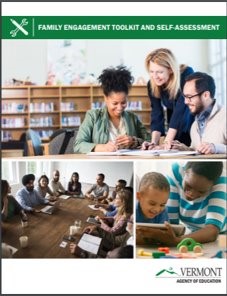Tools to support assessment, growth, and sustainability of Family Engagement
- Vermont Family Engagement Toolkit Introduction
- Family Engagement Self-Assessment
- Family Engagement Self-Assessment and Action Planning Facilitator's Guide
- Family Engagement Equity and Access Tool
- Family Engagement for Individualized Education Program (IEP) Team Members: Ensuring Meaningful Participation by Families
Vermont Family Engagement Toolkit Introduction
Vermont Family Engagement Toolkit Introduction (video): This 13-minute video outlines aspects of the Vermont Family Engagement Toolkit and Self-Assessment and suggestions to get you started.
Family Engagement Self-Assessment
Family Engagement Self-Assessment and Action Planning Facilitator's Guide
Description:
The Family Engagement Self-Assessment is designed to help school systems reflect on current professional practice and to identify the Family Engagement practices or Core Principles you may want to focus on as part of your action plan development and implementation. This Self-Assessment is informed by the self-assessment section of the Family Engagement Toolkit and Self-Assessment (FETSA).
The Family Engagement Self-Assessment will help you identify areas of strength and areas for improvement in your family engagement practices regardless of your current role in your school or program. The Self-Assessment is sectioned by the Seven Core Principles outlined in the FETSA. Individual Self-Assessment items are informed by the "What does it look like in practice?" elements of the Toolkit.
Who should use it?
The Vermont Multi-Tiered System of Supports (VTmtss) Team recommends this tool be completed by a team consisting of administrators, teachers, related service providers, families, and school family engagement coordinators and liaisons if available.
There are several ways to complete the Self-Assessment. (See the Family Engagement Self-Assessment and Action Planning Facilitator's Guide for more information).
- VTmtss Team recommends a facilitated conversation about the collected data by someone familiar with the Family Engagement Toolkit and Self-Assessment. The team may complete the FETSA with the support of the VTmtss Team. A VTmtss Team facilitator leading the process saves the SU/SD or school time and offers team members equal participation.
- Our facilitator will help you: understand the process, provide a link to the Cognito Forms (an anonymous submission), compile individual self-assessment responses from your team members into collective data, and lead a conversation with your team using their data.
- Knowing your SU/SD or school's strengths and growth areas, you can address enhancing family engagement practices or improving the effectiveness of other practices. The VTmtss Team facilitator is available for a follow-up consultation at any time. Contact Nancy.Hellen@vermont.gov to schedule your 20-minute planning call or fill out the VTmtss Team Technical Assistance Request Form to request technical assistance.
- Individuals can complete the Self-Assessment independently and then come together as a team to compare results and reach a consensus on each item, without VTmtss Team technical assistance support. The team may complete the Self-Assessment together and rate each item by coming to a consensus as a group. Following the Family Engagement Self-Assessment and Action Planning Facilitator's Guide is recommended.
- Individuals may choose to complete the Self-Assessment as an opportunity to reflect on their professional practice.
The Action Planning section of the Self-Assessment and Action Planning Facilitator’s Guide compiles FETSA and other resources to further support extended reflection in the continuous improvement process. The data collected from the Family Engagement Self-Assessment and ongoing Action Planning provides system level information for current continuous improvement goals and new goal setting.
Family Engagement Equity and Access Tool
This Family Engagement Equity and Access Tool includes an assessment of current practices. This tool highlights strategies to support school systems, educators, and family engagement personnel with differentiating services and supports based on the unique needs of each child and family. It compiles information from Core Principle 6, Providing Equity and Access of the Vermont Family Engagement Toolkit and Self-Assessment. Equitable family engagement is centered on embracing the unique characteristics and strengths of all families and building partnerships with families. This tool is to be used by school systems, teams, and family engagement personnel to review and strengthen their family engagement through continuous improvement.
Family Engagement for Individualized Education Program (IEP) Team Members: Ensuring Meaningful Participation by Families
This resource provides strategies for Individualized Education Program Team members to consider to develop a more comprehensive approach to family engagement for families of children with disabilities. These strategies may also support school or district family engagement efforts. The strategies are organized by Family Engagement Core Principles and align with the Family Engagement Toolkit and Self-Assessment.

